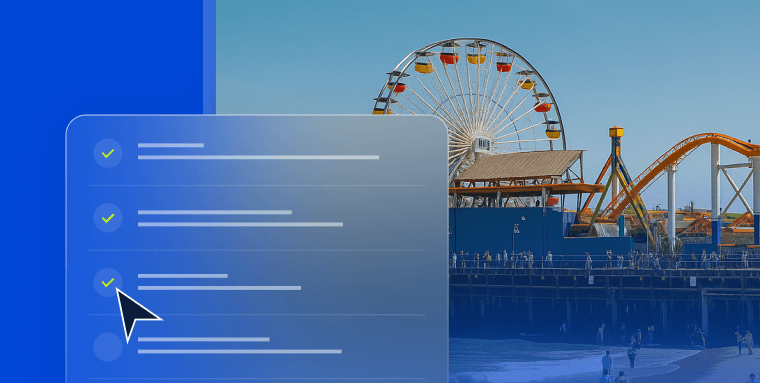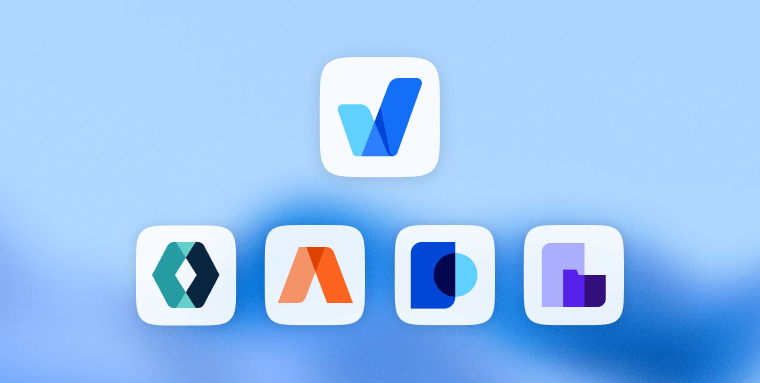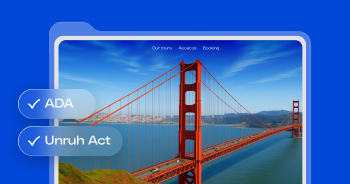California has consistently ranked among the top states for web accessibility lawsuits in recent years, largely due to its strict digital accessibility regulations. With overlapping state and federal regulations, businesses that operate in or serve California face heightened legal risk if their websites are not accessible to people with disabilities.
If your business is based in California or even just serves customers in the state, accessibility is no longer optional. accessiBe provides tailored solutions that support this effort, from automated tools to manual services, helping organizations of all sizes build and maintain accessible digital experiences that meet legal standards and user needs.
Whether you're just beginning your accessibility journey or strengthening existing efforts, it’s essential to understand how these legal requirements apply to your digital presence. Aligning with the Web Content Accessibility Guidelines (WCAG) is widely recognized as the clearest path to compliance, but knowing which laws apply, and how they’re enforced in California, is the first step.
Understanding California’s digital accessibility laws
California has a long history of consumer protection and civil rights enforcement, and its laws often extend beyond federal requirements. As a result, businesses operating in California are held to a high standard, and are among the most likely in the nation to face legal action if their websites aren’t accessible. In fact, 85% of ADA web accessibility-related lawsuits in the United States are filed in California, New York, and Florida.
Here are some of the important California laws that businesses should be aware of.
The Americans with Disabilities Act
At the federal level, the Americans with Disabilities Act (ADA) prohibits discrimination against individuals with disabilities—and though the law doesn’t explicitly mention websites, courts have consistently interpreted it to apply to digital experiences. California enforces this standard, layering state laws like the Unruh Civil Rights Act and other legislation on top of the ADA to create a stricter compliance environment.
Unruh Civil Rights Act
The Unruh Civil Rights Act is one of California’s most powerful legal tools for enforcing digital accessibility. It prohibits discrimination based on race, color, national origin, ancestry, language, immigration status, citizenship, religion, sex, sexual orientation, marital status, disability, medical condition, or genetic information.
Unlike the ADA, the Unruh Civil Rights Act allows plaintiffs to seek monetary damages—with a minimum of $4,000 per violation. That means penalties can add up quickly, especially for websites with multiple accessibility barriers.
The Unruh Act incorporates the federal Americans with Disabilities Act (ADA) by reference, meaning that violations of the ADA are automatically considered violations under California law as well. While the ADA itself doesn’t explicitly mention websites, California courts have consistently interpreted both laws as applying to digital experiences.
AB 434: A Precedent for WCAG Compliance
Assembly Bill 434 (AB 434) went into effect in 2019 and applies to websites operated by California state agencies within the executive branch, including departments, boards, and commissions. These public-sector entities are required to ensure that their websites conform to WCAG 2.0 Level AA (or a later version) and to display a signed certification on their home page.
While AB 434 targets the public sector, it reflects the state’s broader approach: accessibility isn’t a suggestion—it’s a legal and ethical expectation.
CCPA and CPRA
California’s privacy laws, the California Consumer Privacy Act (CCPA) and California Privacy Rights Act (CPRA), also include accessibility provisions. Specifically, businesses must ensure that privacy notices, opt-out options, and user controls are accessible to people with disabilities. This is especially important for businesses collecting personal data from California residents.
Proposed Assembly Bill 1757
Assembly Bill 1757 (AB 1757), introduced in 2024, is still under consideration. It proposes that all websites and mobile apps offering goods or services in California must meet WCAG 2.1 Level AA. If passed, it would also create a private right of action, allowing individuals with disabilities to take legal action against businesses and third-party developers whose digital platforms are not accessible. AB 1757 signals California’s intent to formalize WCAG compliance as a legal obligation.
The cost of inaccessibility
Failing to meet accessibility requirements doesn’t just disadvantage your users. It puts your business at serious financial risk. In California, where web accessibility lawsuits continue to rise, the costs of non-compliance can add up quickly.
Under the Unruh Civil Rights Act, plaintiffs can seek a minimum of $4,000 per violation, and that amount may triple if emotional distress is proven. Because each barrier, such as a missing alt text, broken form, or inaccessible menu, can count as a separate violation, a single lawsuit can result in multiple penalties.
One high-profile example is the 2023 case of Bashin v. ReserveCalifornia, where the web developer behind California’s state parks reservation platform settled for $2 million after users with disabilities were unable to book campsites online.
This case is a clear reminder: in California, inaccessible digital experiences don’t just risk reputational damage - they carry real legal and financial consequences.
How California businesses can meet their accessibility obligations

Given California’s legal landscape and the increasing push toward codified digital accessibility standards, businesses need a clear, actionable path to compliance. Whether you're aiming to reduce legal risk, enhance user experience, or stay ahead of pending legislation, aligning your digital properties with the Web Content Accessibility Guidelines (WCAG) is essential.
WCAG is the benchmark
While California’s laws don’t always specify a technical standard, the most reliable way to comply is to meet the Web Content Accessibility Guidelines (WCAG), particularly WCAG 2.1 Level AA.
AB 434 requires state websites to meet WCAG 2.0 AA. That standard, developed by the World Wide Web Consortium (W3C), has since evolved, and WCAG 2.1 AA is now widely accepted as the benchmark for accessibility in both public and private sectors.
Assembly Bill 1757, introduced in 2024, proposes to make WCAG 2.1 AA a legal requirement for websites and mobile apps that serve California consumers. It would apply not only to businesses but also to third-party developers and vendors, and would create a private right of action for individuals with disabilities.
Although the bill is still pending, its introduction signals where California is heading: toward codifying WCAG as the legal baseline for digital accessibility.
Courts are already using WCAG as the standard
California courts consistently look to WCAG compliance as the defining measure of accessibility. In Robles v. Domino’s Pizza, a blind California resident sued the company over its inaccessible website and mobile app. The Ninth Circuit ruled in favor of the plaintiff, with WCAG violations playing a central role in the case.
Similarly, in Thurston v. Midvale Corp., a blind plaintiff alleged that the restaurant’s website was not accessible with her screen reader. The California Court of Appeal upheld a ruling in favor of the plaintiff, concluding that the business violated the Unruh Civil Rights Act by failing to ensure its website was accessible. The court specifically referenced WCAG compliance as the appropriate benchmark for determining accessibility.
In short, whether you're defending against a lawsuit or aiming to get ahead of pending legislation, adhering to WCAG 2.1 AA is the clearest path to accessibility compliance in California.
How accessiBe helps you stay compliant and inclusive

accessiBe offers a suite of solutions designed to support businesses at every stage of their digital accessibility journey from AI-powered solutions to manual remediation or a custom blend of both.
Whether you're looking for a hands-off solution, developer-level control, or expert guidance, accessiBe provides the tools and support to help you meet WCAG standards and comply with California’s accessibility laws.
accessScan: Understand your accessibility status
accessScan is a free, AI-powered tool that helps you check whether your website is accessible and ADA compliant in seconds. Just enter your URL to instantly identify any barriers that might prevent people with disabilities from navigating your site. You'll receive a clear, actionable report you can download and share with your team.
With over 650,000 scans performed annually, accessScan gives you a fast, reliable starting point for your accessibility efforts.
accessWidget: AI-powered remediation
accessWidget makes web accessibility simple and scalable. Using advanced AI, it scans your website for accessibility issues and remediates them, helping you align with WCAG 2.1 (and 2.2) Level AA standards. It conducts scans every 24 hours to maintain your accessibility and stay up to date with changing content.
Quick to install and fully compatible with platforms like WordPress, Shopify, and Wix, accessWidget is session-based so it doesn’t impact your website’s loading time. Its on-screen accessibility interface also offers profiles and adjustments that let users customize their experience to meet their individual needs.
MTCR: Manual testing and custom remediation
MTCR combines the power of automation with the precision of human expertise to deliver a deeper level of accessibility assurance. Starting with accessWidget as a foundation, our team of accessibility experts manually tests your website using assistive technologies and real-world user flows like navigation, forms, and checkout.
We then implement tailored fixes to address issues that automation alone can’t resolve, helping your site meet WCAG 2.1 and 2.2 Level AA with greater accuracy. MTCR is ideal for high-traffic sites, complex digital experiences, or businesses in legally sensitive industries.
Book a demo.
accessFlow: Accessibility management platform for developers
accessFlow is an accessibility management platform that empowers development teams to create accessible digital experiences directly in their codebase, without relying on external tools or expertise. It automates issue detection, prioritization, and remediation, streamlining the entire process from scan to fix.
With built-in guidance, smart task management, and seamless integration into existing workflows, accessFlow helps teams save time, reduce costs, and scale accessibility efficiently, all while maintaining long-term compliance aligned with WCAG 2.1 AA.
Book product tour.
accessServices: Expert-led support for full accessibility readiness
accessServices offers hands-on expertise to help you go beyond your website and address accessibility across your digital assets. From file and media remediation to VPATs, audits, and strategic consulting, our team delivers tailored solutions with accuracy, speed, and transparency.
You’ll work with seasoned accessibility professionals, including people with disabilities, to ensure optimal results. With quick turnaround times, clear pricing, and reliable delivery, accessServices makes it easy to meet compliance requirements and support inclusive access across your organization.
Get a quote.
Stay ahead of California’s accessibility expectations
With evolving laws, active enforcement, and growing user expectations, accessibility in California isn’t just a legal box to check—t’s a fundamental part of running a responsible, future-ready business.
accessiBe’s solutions are designed to help you meet compliance requirements while creating digital experiences that work better for everyone. Whether you need fast, AI-powered coverage or a tailored approach with expert support, we’re here to help you move forward with confidence.
Start with a free accessScan, or get in touch to find the solution that fits your needs.
Frequently asked questions about California web accessibility laws in 2026
Q1. Which laws govern web accessibility for businesses operating in California?
A1. Key laws include the federal Americans with Disabilities Act (ADA) and California’s state-level civil rights protections such as the Unruh Civil Rights Act. Together they establish obligations for online services to be accessible for people with disabilities.
Q2. Why is California higher risk for web accessibility issues than other U.S. states?
A2. California has one of the highest volumes of web accessibility claims—because of stringent state laws, overlapping federal liabilities, and active enforcement. Websites accessible in or serving California customers face elevated legal exposure.
Q3. What technical accessibility benchmark is widely accepted in California?
A3. The Web Content Accessibility Guidelines (WCAG) 2.1 Level AA is treated as the de facto standard for digital accessibility in California even when not expressly mandated by state law.
Q4. Do California web accessibility laws only apply to companies with a physical branch in the state?
A4. No. Businesses that offer goods or services to California residents—online or otherwise—may be subject to state laws even without a physical presence in California, because state courts have interpreted “public accommodations” broadly.
Q5. What are the potential consequences of non-compliance for websites under California law?
A5. Legal exposure may include demand letters, lawsuits, statutory damages, attorney’s fees and reputational damage. Documentation of goodwill efforts to meet accessibility can help mitigate risk.
Q6. How can accessiBe help businesses with California web accessibility laws?
A6. accessiBe offers an accessibility ecosystem including automated scanning, AI-driven remediation, expert manual reviews and native accessibility solutions that help align websites with WCAG 2.1 and 2.2 Level AA, reducing risk under both California and federal accessibility laws.




